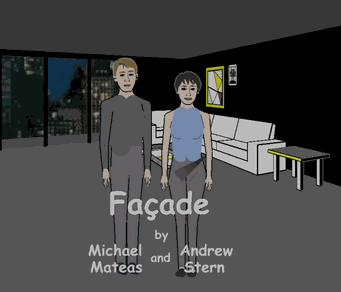Topic Facade game: Discover the groundbreaking realm of "Facade Game," an interactive drama pioneering the use of AI in storytelling, offering a unique and immersive experience in narrative gaming.
Table of Content
- Introduction to Facade
- Development and Innovation
- Gameplay Mechanics
- Technical Achievements
- Awards and Recognition
- Retrospective Views and Cultural Impact
- YOUTUBE: Façade - A Psychological Horror AI Game
- Gameplay Experience and Player Interaction
- Legacy and Influence on Future Gaming
- Accessibility and Technical Support
- Conclusion
Introduction to Facade
"Facade," a trailblazing interactive drama game, masterfully blends artificial intelligence and narrative to create a unique gaming experience. Developed by Andrew Stern and Michael Mateas, it was released in 2005, setting new standards in the realm of video games. This game revolutionized the industry by shifting the focus from traditional gameplay mechanics to complex character interactions and storytelling.
- The game centers around a couple, Grace and Trip, and their turbulent marriage. Players interact with these characters by typing responses, influencing the story"s direction and outcome.
- Facade"s advanced AI allows for a highly responsive and dynamic narrative, adjusting to player inputs in real-time. This creates a different experience for each playthrough, as the game"s characters react naturally to a wide range of player responses.
- Notably, Facade won the Grand Jury Prize at the 2006 Slamdance Independent Games Festival, acclaiming its innovation in game design.
- The game"s popularity resurged with the advent of YouTube and streaming platforms, where it became a favorite for its unique gameplay and narrative style.
- Despite its older graphics, Facade remains a significant piece in the history of video gaming, particularly in the development of AI-driven storytelling.
Facade"s emphasis on dialogue and character interaction over traditional action elements makes it a landmark in the gaming world, continuing to intrigue and inspire players and developers alike.

READ MORE:
Development and Innovation
The development of "Facade" represents a significant milestone in the gaming industry, particularly in the field of interactive drama and AI. Creators Andrew Stern and Michael Mateas, both with backgrounds in art and artificial intelligence, embarked on a journey to create a game that was fundamentally different from existing titles.
- Their vision was to design a game where narrative and character interactions were at the forefront, diverging from traditional gameplay focused on action or strategy.
- Development of Facade started in the early 2000s, with a focus on integrating advanced AI to allow for real-time dialogue and interaction. This was a groundbreaking approach, as it allowed players to engage in conversations with game characters in a fluid and natural manner.
- The AI used in Facade was not just about scripted responses; it was about understanding player inputs and responding in a contextually relevant way. This required extensive work in natural language processing and behavior modeling.
- Another innovation in Facade was its use of procedural narrative generation. The story was not fixed but dynamically altered based on player choices, leading to multiple storylines and endings.
- The game"s development also involved creating detailed 3D environments and character models, which were advanced for the time and contributed to the immersive experience.
This ambitious project took several years to complete, reflecting the complexity and novelty of the technology and narrative design involved. The result was a game that was not just entertaining but also a piece of digital art, pushing the boundaries of what was possible in interactive storytelling.
Gameplay Mechanics
Facade, an innovative game in the genre of interactive drama, offers a unique gameplay experience centered around conversation and character interaction rather than traditional gaming mechanics. Developed by Michael Mateas and Andrew Stern, the game uses advanced AI to create an engaging narrative driven by player choices.
- In Facade, players enter the lives of Grace and Trip, a couple facing marital issues, and interact with them through a typing interface. This allows for a deep level of engagement, where player input directly influences the narrative.
- The game"s AI system interprets the player"s typed sentences, enabling Grace and Trip to respond with a range of emotions and dialogue that align with the flow of the conversation. This makes each gameplay experience unique.
- Players are free to explore the apartment, interact with various objects, and engage in dialogue with the couple. Their actions lead to one of multiple possible endings, including resolutions or confrontations in the couple"s relationship.
- Facade"s gameplay is groundbreaking in its focus on adult themes and relationships, contrasting sharply with more conventional action-centric games. It offers an experience that"s less about escapism and more about engaging with realistic, emotionally charged scenarios.
- The game"s narrative structure differs from traditional games, as it allows for a more free-flowing interaction, moving beyond pre-determined storylines to create a dynamic story shaped by player choices.
Despite its groundbreaking approach, Facade does face limitations, particularly in its AI"s ability to perfectly interpret and respond to player input, leading to occasional lapses in conversation fluidity. Nevertheless, its innovative gameplay mechanics and use of AI in storytelling have left a lasting impact on the gaming industry.

Technical Achievements
Facade, a game renowned for its innovative use of artificial intelligence in interactive storytelling, marked a significant technical achievement in game design. The game utilized advanced AI techniques to dynamically change the emotional states of characters in response to player interactions, showcasing the potential of AI in creating deep, character-driven narratives.
- The game"s AI was capable of processing player input through natural language processing, allowing for realistic and nuanced character responses.
- Emotional modeling, facial expressions, and body language were integrated to create more lifelike interactions between the game"s characters and the player.
- Facade"s AI system was a pioneering effort in the field, demonstrating the possibilities of AI-driven storytelling in video games.
- The game received acclaim for its ambitious and revolutionary approach, highlighting its role as an important research and cultural milestone in the gaming industry.
- Despite some limitations in execution, such as occasional awkward character reactions to player inputs, Facade"s AI system was praised for its ability to handle genuine interaction, contributing to its lasting impact on the industry.
Facade"s technical achievements in AI not only earned it contemporary praise but also established its status as a groundbreaking project in the realm of interactive drama and video games.
Awards and Recognition
Facade, a groundbreaking interactive drama and AI-based game, has garnered significant recognition and awards for its innovative approach to gaming. Developed by Michael Mateas and Andrew Stern, the game stands out for its technical innovation and cultural impact in the field of video games.
- Facade won the prestigious Grand Jury Prize at the 2006 Slamdance Independent Games Festival, showcasing its outstanding contribution to independent gaming.
- An early, incomplete version of the game was a finalist at the 2004 Independent Games Festival, highlighting its potential even in its developmental stages.
- The game"s unique approach and technical achievements have been recognized and exhibited at several international art shows, including ISEA 2004 and Game/Play 2006.
- Mainstream publications have lauded Facade, with the New York Times describing it as "the future of videogames", emphasizing its advanced AI techniques and emotional depth in character design.
- Facade has also been featured in academic and cultural discussions, illustrating its significance beyond the gaming community. It has been cited as an important research and cultural milestone in the advancement of artificial intelligence in video games.
These accolades reflect Facade"s impact and pioneering role in the gaming industry, particularly in the realm of AI-driven interactive storytelling and character development.

Retrospective Views and Cultural Impact
Facade, created in 2005 by Michael Mateas and Andrew Stern, has had a significant impact on both the gaming industry and digital art, recognized for its innovative use of artificial intelligence in interactive storytelling. The game"s focus on adult relationships and dialog-driven gameplay marked a departure from traditional game designs, emphasizing emotional depth and player choice.
- Upon its release, Facade was acclaimed by mainstream news publications for its groundbreaking design, highlighting the potential of AI in video games and setting a new standard for character-driven narratives.
- The game"s unique gameplay mechanics and AI systems have inspired a range of retrospective discussions and analyses, acknowledging Facade as a pioneering project in interactive drama.
- Facade"s cultural significance is also evident in its wide appeal, particularly in online streaming communities. The game has become a subject of interest and entertainment, allowing players to experiment with its narrative possibilities in various playthroughs.
- Despite its acclaim, the game has also faced criticism for its execution of interpersonal interactions and the limitations of its AI system. However, these aspects have not diminished its status as an important and innovative work in the realm of video games and AI.
Overall, Facade remains a notable example of how video games can transcend entertainment, offering deep and meaningful experiences that challenge conventional game design and storytelling.
Façade - A Psychological Horror AI Game
Brace yourself for a spine-chilling experience like no other in this gripping horror video. Prepare to be terrified as you enter a world filled with suspense, jump scares, and heart-pounding moments that will leave you on the edge of your seat.
Façade - A Psychological Horror AI Game
Brace yourself for a spine-chilling experience like no other in this gripping horror video. Prepare to be terrified as you enter a world filled with suspense, jump scares, and heart-pounding moments that will leave you on the edge of your seat.
Gameplay Experience and Player Interaction
Facade, developed by Andrew Stern and Michael Mateas, stands out in the gaming industry for its innovative gameplay and unique player interaction. The game combines real-time interaction with drama, offering players an immersive experience where they directly communicate with non-player characters (NPCs) in a dramatic scenario.
- The game is set in the apartment of Grace and Trip, a couple facing marital issues. Players interact with these characters through a typing interface, influencing the narrative"s direction and outcome.
- Players can explore the apartment, interact with objects, and converse with the characters. The AI interprets player inputs, enabling characters to display emotions like elation, surprise, or anger, contributing to a dynamic and responsive gameplay experience.
- Facade"s use of AI, particularly natural language processing, allows the game to analyze and respond to typed text, making the interactions feel more genuine and fluid. However, the system, impressive for its time, has its limitations in capturing all nuances of language.
- One of the key features of Facade is the range of choices and dialogue options available to players, shaping the interactions and determining the story"s outcome.
- Despite challenges in development, Facade has been a significant accomplishment in AI-driven storytelling and interactive drama, inspiring subsequent projects and sparking interest in AI"s possibilities in gaming.
Facade"s approach to gameplay, focusing on character interaction over traditional action elements, marks it as a landmark in the gaming world, influencing how stories can be told through interactive media.

Legacy and Influence on Future Gaming
Facade, a unique and innovative game developed by Andrew Stern and Michael Matteas, has left a lasting legacy in the gaming industry and AI research. Its impact goes beyond its initial release, influencing the development of future games and the application of artificial intelligence in gaming.
- Facade"s innovative use of AI systems to interpret player input and drive the narrative set a new benchmark in gaming, showcasing the potential of AI in video games.
- The game"s development, as an academic research project, required significant time and effort, demonstrating the complexities and challenges in creating AI-driven interactive dramas.
- Its unconventional gameplay mechanics, focusing on real-time interaction and drama, have inspired subsequent projects in the gaming industry, exploring the possibilities of AI-driven storytelling.
- Despite its challenges, Facade has gained recognition for its technical achievements in AI and its role in expanding the narrative and emotional possibilities within video games.
- The game"s influence is evident in its continued study and recognition within the gaming community, establishing the reputations of its creators and inspiring future developments in the industry.
Facade"s contribution to interactive drama and AI in gaming has made it a significant and enduring work, influencing the direction and possibilities of future gaming experiences.
Accessibility and Technical Support
Downloading and Installing Façade: Façade is available for download on Windows platforms. To access the game, visit the official website of Playabl Studios and follow the download link provided.
System Requirements: Ensure that your system meets the requirements for optimal gameplay. Façade is developed using Playabl AI, Java, and C++, which may have specific system requirements for smooth operation.
Gameplay Tips: The game is known for its advanced AI and conversational mechanics. Players should use proper spelling and grammar for the best experience. Unique aspects of the game, such as certain words triggering unexpected responses from characters, add to the immersive experience.
Technical Issues: Some players have reported issues such as long loading times or problems with game initiation. If you encounter similar issues, consider checking your system compatibility or reinstalling the game. Patience is key, as some aspects of the game, like waiting for characters to respond, are part of the design.
Community Support: If you"re facing difficulties or need gameplay advice, online forums and community discussions can be a great resource. Many players share their experiences and solutions to common problems encountered in the game.
Contacting Support: For further technical assistance or specific queries, you can reach out to Playabl Studios via their official website. They provide support and updates about the game.
Note on Game Evolution: Since its release, Façade has undergone various updates and changes. Stay informed about the latest versions and patches for the best gameplay experience.

READ MORE:
Conclusion
Facade, a groundbreaking game developed by Andrew Stern and Michael Mateas, stands as a significant milestone in the realm of video games and artificial intelligence. It has been recognized not only for its innovative gameplay mechanics but also for its pioneering use of advanced conversational AI and procedural storytelling. With over 5 million downloads, Facade has left an indelible mark on the gaming community, academia, and popular culture.
The game"s unique approach to interactive drama, where players engage in real-time conversations with the characters Grace and Trip, has been lauded for its technical achievement in AI application. Facade"s AI systems employed natural language processing techniques to create dynamic, emotionally responsive interactions, reflecting the complexities of human conversation and relationship dynamics.
Despite its experimental nature and some limitations in its execution, Facade received contemporary praise from mainstream publications and won the Grand Jury Prize at the 2006 Slamdance Independent Games Festival. It was recognized as a significant research and cultural milestone, pushing the boundaries of video game design and AI technology. The game"s impact extended beyond its initial release, influencing future projects and sparking debates about the potential of AI in video games.
Facade"s legacy continues to inspire developers and researchers in the field of AI and interactive storytelling. It stands as a testament to the creative possibilities of video games and the power of AI to evoke complex emotions and immersive experiences in interactive entertainment. Facade"s influence on the gaming industry and its contributions to the development of emotional AI in games will be remembered as a key chapter in the evolution of video games.
Exploring the innovative realm of AI and interactive storytelling, Facade stands as a testament to the power of video games in shaping narratives and emotional experiences, leaving a lasting impact on gaming and AI development.















:max_bytes(150000):strip_icc()/GOT_MP_100114_EP510-46671-4358f8a6f0924617b92d8435f4ab11a4.jpg)